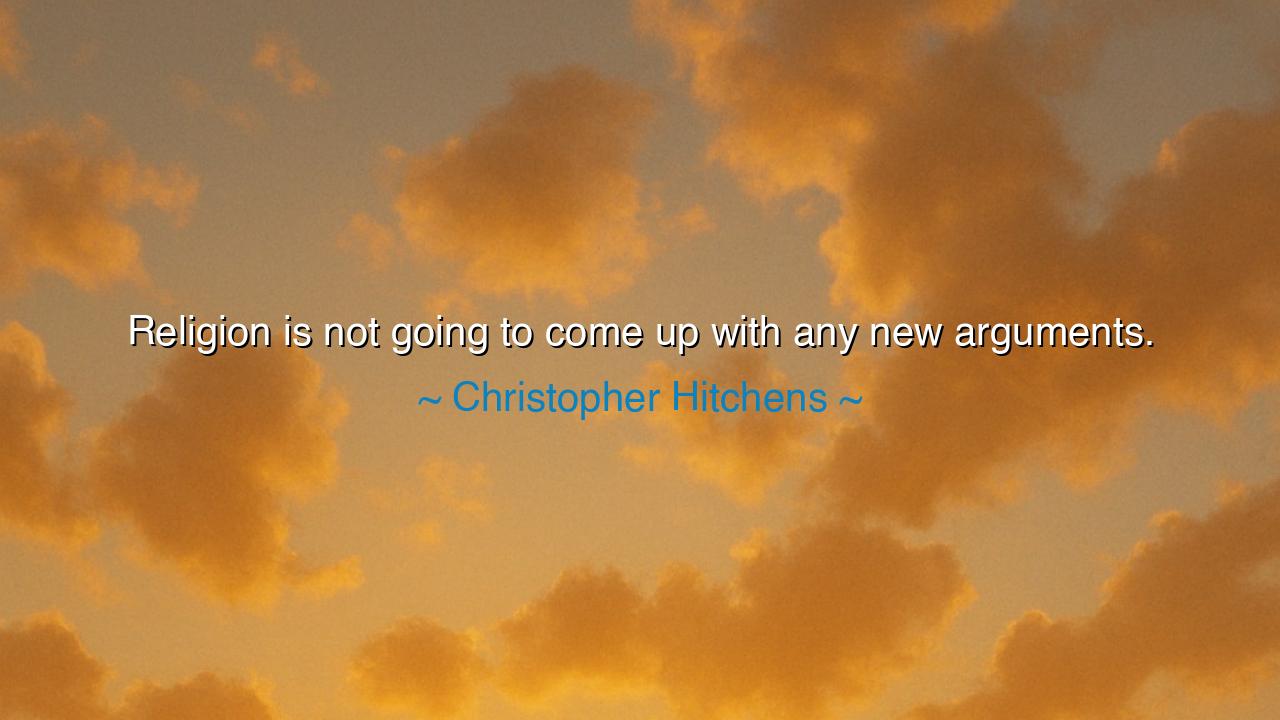
Religion is not going to come up with any new arguments.






Hear then, children of the ages, the words of Christopher Hitchens: “Religion is not going to come up with any new arguments.” This utterance, sharp as the sword of a seasoned warrior, strikes deep into the heart of human inquiry. For thousands of years, humankind has wrestled with questions of origin, purpose, and destiny. Yet the patterns of belief, the same defenses and proclamations, circle endlessly, like a chariot bound to a track it cannot abandon. Hitchens speaks not in contempt alone, but as one pointing out the stillness of a well that no longer yields fresh water. The arguments of religion, from ancient shrines to cathedral pulpits, remain unchanged, repeated with the same cadence across generations, as though time itself were frozen in their defense.
Consider how reason and science, by contrast, are ever-renewing. Each generation steps upon the shoulders of the last, peering further into the cosmos, unearthing new truths in stone and star alike. Yet the defenders of faith continue to sound the same horns: appeals to mystery, to authority, to tradition, to divine decree. Their arsenal is as it was millennia ago, when priests first declared lightning to be the anger of the gods. Hitchens, in this brief phrase, teaches us to see that while humanity marches forward in knowledge, religion clings to its ancient armory, polishing the old weapons but forging no new ones.
Look back to the days of Galileo Galilei, who dared lift his gaze toward the heavens and proclaim that Earth was not the still center of all things. Against him stood the Church, not with new revelations, not with fresh reasoning, but with the same ancient cry: “It is written, and thus it must be so.” Yet truth, borne on the wings of discovery, outlasted their resistance. The arguments of religion were the same as they had ever been, rigid and unyielding. But the mind of humankind, restless and unchained, pressed forward until the stars themselves were mapped, and the earth was known to spin.
And what of Darwin, centuries later, trembling as he unveiled the theory of evolution? Again the chorus rose: “This cannot be, for our sacred texts forbid it.” But their protest was no different than before. It was the echo of the same defense raised against every dawn of new knowledge: tradition guarding itself against illumination. Hitchens’ words remind us that the shield of religion does not grow, it does not adapt, it does not invent new defenses. It merely repeats, hoping repetition itself might stand against the tide of discovery.
Yet let not our hearts grow arrogant, for the lesson is not merely to mock the past. The lesson is to recognize stagnation wherever it appears—in temples, yes, but also in ourselves. To cling to what is old simply because it is comfortable is to deny the power of the human spirit. The gift of reason, the fire Prometheus brought to mortals, demands that we not rest in shadows. We must forge new tools, seek new understandings, and not be content to chant the arguments of yesterday as if they alone could guide us through tomorrow.
Thus, the teaching is clear: do not accept the comfort of answers that are endlessly recycled, whether in the tongue of priest or politician, elder or scholar. Seek instead the path of fresh discovery. Test every claim, weigh every argument, ask always: “Is this truth alive, or merely an echo?” For the world is wide, and the heavens are vast, and to walk in them requires more than borrowed words.
Practically, let each of us act. Read not only the scriptures of old but also the books of new thought. Learn from the past, but demand from it proof, not mere reverence. When you hear a claim, ask: “Has this been said for a thousand years unchanged? If so, does it stand because it is true, or only because it is repeated?” In your conversations, your studies, and even in your quiet reflections, let this be your guard: do not let old arguments lull you into stillness. Question them, stretch them, measure them against the light of today.
For the legacy of Hitchens’ words is not despair but freedom. They remind us that the arguments of religion are ancient and unchanging, but the arguments of human curiosity are boundless. You, who live now, must decide which song to sing: the echo of the old, or the creation of the new. Choose, then, to be creators, seekers, and lovers of truth. In this way, your voice will not be a repetition, but a revelation.






AAdministratorAdministrator
Welcome, honored guests. Please leave a comment, we will respond soon